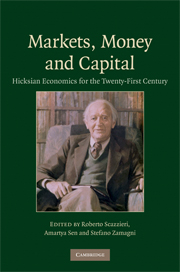Book contents
- Frontmatter
- Contents
- List of figures
- List of tables
- List of contributors
- Preface and acknowledgments
- Between theory and history: on the identity of Hicks's economics
- Part I The Intellectual Heritage of John Hicks
- Part II Markets
- Part III Money
- Part IV Capital and Dynamics
- References
- Name index
- Subject index
Between theory and history: on the identity of Hicks's economics
Published online by Cambridge University Press: 29 June 2009
- Frontmatter
- Contents
- List of figures
- List of tables
- List of contributors
- Preface and acknowledgments
- Between theory and history: on the identity of Hicks's economics
- Part I The Intellectual Heritage of John Hicks
- Part II Markets
- Part III Money
- Part IV Capital and Dynamics
- References
- Name index
- Subject index
Summary
Hicks's economic theorizing
John Hicks was one of the most influential economists of the twentieth century. His contributions have shaped the core theories of rational choice and human welfare, value and money, capital and growth. At the same time, Hicks's contributions often address contentious issues, and sometimes suggest unconventional and controversial points of view. In John Hicks, we see economic theorizing at its most fundamental, almost formative, stage. In his writings, economic theorizing strives to achieve, and succeeds in maintaining, a balance between the requirements of analysis and the explicit recognition of the relevance of history and institutions. In short, Hicks's contribution to economics belongs both to the so-called ‘mainstream’ and to its critique.
This characteristic feature of Hicks's work derives from a seemingly simple, but in fact highly sophisticated, approach to the construction of economic theory. Hicks takes theories to be the product of a particular ‘concentration of attention’ (Hicks, 1976a: 209). Theories are focusing devices that may be effective in bringing to view certain causal patterns, while leaving other (possible) causal patterns aside. This makes theories essential to economic analysis (as some concentration of attention is a necessary condition for the identification of a causal relationship). The same approach makes multiple theories possible, however. Indeed, the possibility of distinct theoretical frameworks is a most natural consequence of changes in the concentration of attention (see Scazzieri, 1993b). Moreover, such changes are often necessary to preserve the relevance of theories vis-à-vis historical or institutional changes.
- Type
- Chapter
- Information
- Markets, Money and CapitalHicksian Economics for the Twenty First Century, pp. 1 - 38Publisher: Cambridge University PressPrint publication year: 2009
- 5
- Cited by



